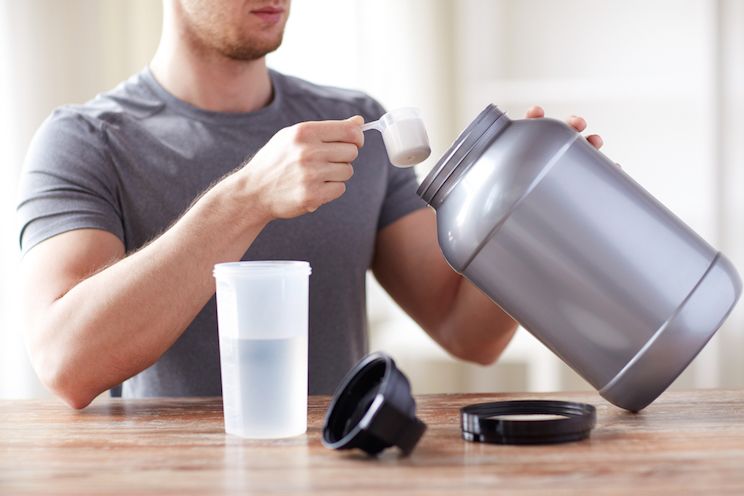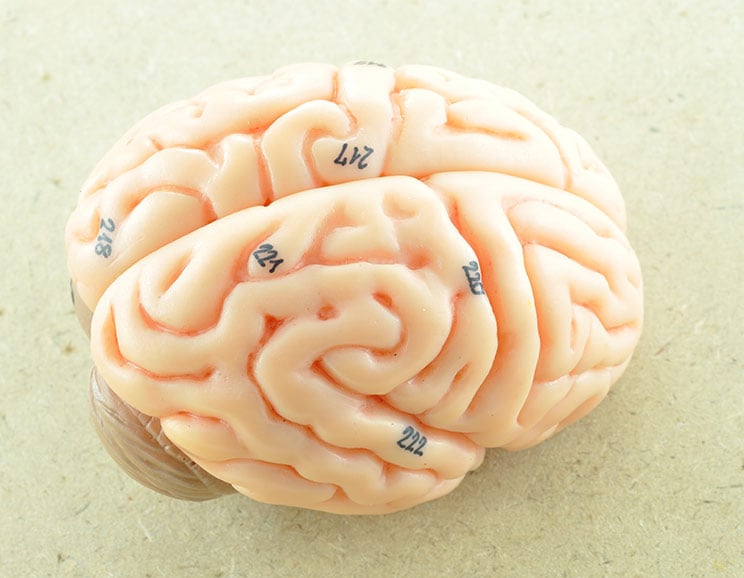When most people hear the word creatine, they immediately think of high school or college-age jocks trying to get bigger and stronger. But this protein is far more than just a muscle-building supplement.
In fact, its benefits range from improved cognitive function, concussion prevention, autoimmune support and even improvement of some chronic degenerative conditions.
Not quite sure what creatine can do for you? Let’s take a closer look.
Want to train your brain to be happier and healthier?
Click here to receive our FREE 7-Day Meditation Challenge!
What is Creatine?
Creatine is a protein that is produced naturally in the body and is found in abundance in animal protein. It’s a high-energy molecule made up of three amino acids – arginine, methionine and glycine – that helps to produce ATP, the energy currency of every cell in your body. Without ATP, your cells would have no fuel and you wouldn’t even survive!
Animal protein is the best food source of creatine, such as grass-fed beef, wild game meats, ocean-fresh fish and free-range poultry. So, if you’re already following a Paleo approach to eating, naturally rich in animal protein, why would you need to add more via a supplement? Adding a creatine supplement allows your body to store greater than normal levels of it in the body, thereby providing an added source of ATP to support your muscles and your brain. While these supra-physiological doses may not be exactly Paleo, there could be certain scenarios where you can get significant benefits.
Can Creatine Boost Your Performance In The Gym?
If you want to improve your performance in any sport, then improving your power, strength and lean muscle mass are key factors. Creatine significantly improves all of these areas, and then some.
Increasing your maximum strength is like adding more horsepower to your car’s engine; the stronger you are, the faster you run. Supplementing with creatine is proven to increase your max strength by 5-15%, which translates to more weight on your squat, deadlift or Olympic lifts. (1)
[tweet_quote] If you want to add lean muscle, creatine has been proven to add 2-4 lb. of fat-free lean muscle in 4 to 12 weeks of training. [/tweet_quote]Creatine supplementation has also been shown to increase sprint performance, as well as endurance during repeated sprints. (2) This can help endurance athletes improve 5k, 10k and marathon times, cyclists upgrade time trial personal bests, and CrossFitters achieve superior WOD times.
If you want to add lean muscle, creatine has been proven to add 2-4 lb. of fat-free lean muscle in 4 to 12 weeks of training.(3) The muscle growth comes from the body’s capacity to increase ATP production from this supplementation, allowing you to train harder and recover faster. If you’re not wanting bigger muscles, simply modifying the dose can mitigate these effects.
The benefits don’t stop there.
Can Creatine Boost Performance at Work?
One of the most common questions I get asked by clients in clinical practice is, “How can I improve my mental focus and memory?” If you want to upgrade cognitive function, working memory and intelligence, then creatine may help unlock your true potential.
[tweet_quote] The researchers found those people supplementing with creatine had improved working memory, reduced mental fatigue and increased intelligence. [/tweet_quote]Creatine has shown significant promise as a potent brain-boosting nutrient. A study at the University of Sydney examined the effects of 6 weeks of supplementation (5g per day) on memory and intelligence. (4) The researchers found those people supplementing with creatine had improved working memory, reduced mental fatigue and increased intelligence. That’s right, not only can you remember more details and maintain your focus for an increased number of hours, you actually get smarter, as well!
More and more research is coming down the pipeline uncovering creatine’s ability to boost brain function, focus and mental productivity. However, you can eat all the meat in the world, but your natural levels cannot reach these supra-physiological levels without added supplementation.
Tempted to start benefiting from higher creatine and ATP levels in your body? Let’s take a look at whether this stuff is really safe.
Is Creatine Safe?
Anecdotal side effects of creatine often heard in the media include dehydration, cramping, musculoskeletal injury, gastrointestinal distress and kidney damage, yet the research does not support these claims.
While these side effects seem scary, none of this has been shown in the research studies. In fact, research on creatine supplementation of 10 months to 5 years found no negative effects on kidney function (5) and has in fact been linked with improving medical conditions such as brain and spinal cord injuries, muscular dystrophy, diabetes and high cholesterol.
With all the fad supplements out there, creatine is a proven and safe strategy for upgrading your health and your performance. Let me walk you through the approach I typically recommend to my clients.
How Much Should I Take?
If you want to boost your performance in the gym and at work and give creatine a try, here is the best way to start. For men, add a 5g serving every day with a meal; for women, 3g per day. Creatine monohydrate is the most cost-effective form and actually the type they use in all the research studies, so save yourself a few dollars and forget the expensive stuff with supposed “bells and whistles”.
[tweet_quote] Giving creatine a try? For men, start with 5g serving every day with a meal; for women, 3g per day. [/tweet_quote]You can add a powder form (make sure it has no added sugar) into some water and drink it; just be sure to eat a meal at the same time, as elevated blood sugars and insulin help improve absorption. You can also opt for capsules, but it’s a lot of pills to take on a daily basis (typically 6 x 500mg for women and 10 x 500mg for men).
Continue for 8-12 weeks and see for yourself how you look, feel and perform. If you’re satisfied with your results, you can discontinue it. The washout period for creatine levels to return to pre-supplement baseline is about 30 days. If you want to continue, the research shows you can maintain your dose for 6-12 months, if desired. However, periodic tapers of 2-3 weeks is recommended every 3 months.
Just remember that creatine isn’t a quick fix. You still need to eat real, whole food, train properly and get quality sleep if you want to improve brain function and body composition. If your diet and lifestyle are junk, supplementing isn’t going to help much.
(Read This Next: The Truth About Fish Oil)







 Buttery Paleo Chocolate Tart Recipe
Buttery Paleo Chocolate Tart Recipe







Show Comments